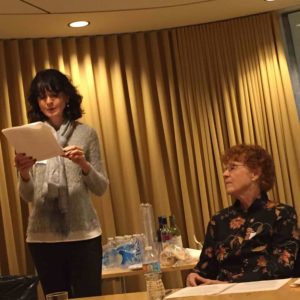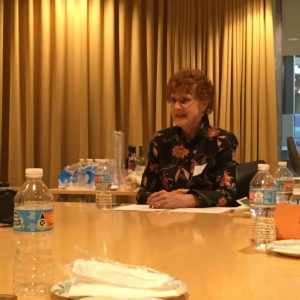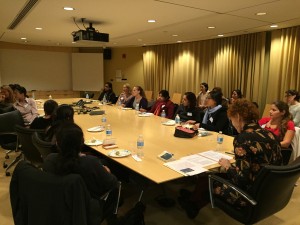Figure out what drives your heart, then own it. And by God, they will let you play.
In the evening of Tuesday, September 27th in Cambridge, a group of about thirty women engaged in industry, academia, law, entrepreneurship, and more, gathered around a conference room table. They were there not just to hear Michele Whitham speak about how she came to “own her own football”, but to connect and share ideas about handling conflict in the workplace.
Michele Whitham is a powerhouse of a woman with a list of accolades and accomplishments that easily make her one of the most admirable women I have ever met: she is a lawyer that is heavily involved in social justice, activism, and community engagement, is a 2015-2016 Inductee into the National Association of Professional Women and the Association’s VIP Woman of the Year, was a co-leader to launch the inaugural Women’s Bar Association of Massachusetts’ Women’s Leadership Initiative, and so much more. Even more impressive is that behind her stunning achievements, she is a kind, empathetic, insightful, and strong-willed woman with a story that so many of us can relate to.
 Leaning into the table and talking to us like old friends do, Michele described how she discovered a love for football at five years old. She set her sights on becoming a football player, and would practice throwing the ball around with her father and her neighbor, Al Cowen, a well-known footballer in Texas. She started going to pickup football games, but time and time again she was the only girl, and she would never get picked to play. Undeterred, she continued to return to these games until a few years later, her father came home and surprised her with a gift: an official NFL football, signed by the one and only Cowen. The very next pickup game she went to, she proudly brought her own football, and not only did she get to play, but she got to be the captain.
Leaning into the table and talking to us like old friends do, Michele described how she discovered a love for football at five years old. She set her sights on becoming a football player, and would practice throwing the ball around with her father and her neighbor, Al Cowen, a well-known footballer in Texas. She started going to pickup football games, but time and time again she was the only girl, and she would never get picked to play. Undeterred, she continued to return to these games until a few years later, her father came home and surprised her with a gift: an official NFL football, signed by the one and only Cowen. The very next pickup game she went to, she proudly brought her own football, and not only did she get to play, but she got to be the captain.
The message of her childhood story was simple: listen to your heart and what drives you, be  confident in it, bring it to the table, and the people sitting across from you will let you play because you are owning the part of yourself that put you there. That is the first lesson in conflict communication: practice the art of self-empowerment and cultivate your professional presence. Consider what you are aiming to achieve, and decide how you are going to approach a situation. Have confidence in your abilities to do all that you can do, and be committed to listening and learning as much as you can about the motivations and values of other people in the room.
confident in it, bring it to the table, and the people sitting across from you will let you play because you are owning the part of yourself that put you there. That is the first lesson in conflict communication: practice the art of self-empowerment and cultivate your professional presence. Consider what you are aiming to achieve, and decide how you are going to approach a situation. Have confidence in your abilities to do all that you can do, and be committed to listening and learning as much as you can about the motivations and values of other people in the room.
There were six other points highlighted throughout the evening that sum up the most important nuggets of wisdom that Michele presented as the keys to her continued success in dealing with conflict:
- Everyone deals with conflict differently; appreciate those differences.
- Don’t take conflict personally; someone else’s reaction is not a reflection on ourselves.
- Be willing to listen to what the other person is saying, and if needed, express that you need to step away to process.
- Make an effort to maintain your credibility, to be mature, and to not let your emotions get the best of you. (Step away if emotions are running too high!)
- Become proactive institutional anthropologists: observe and learn the motivations/desires of your colleagues even before conflict arises.
- Cultivate a circle of key informants, or people that you trust to lend insights into how someone else may be conceptualizing the conflict.
 By the end of the evening, more than half of us in the room had joined in with Michele’s pointers to ask questions, provide thoughtful insight, and share our own positive or negative experiences. Conflict is something that we all have to deal with, and none of us are in this alone. Approaching a conflict with maturity, a willingness to listen to others and a sense of your own self-are three important pieces to successful resolutions. And we must not forget to lean on each other for help when we need to see more sides to the story.
By the end of the evening, more than half of us in the room had joined in with Michele’s pointers to ask questions, provide thoughtful insight, and share our own positive or negative experiences. Conflict is something that we all have to deal with, and none of us are in this alone. Approaching a conflict with maturity, a willingness to listen to others and a sense of your own self-are three important pieces to successful resolutions. And we must not forget to lean on each other for help when we need to see more sides to the story.


